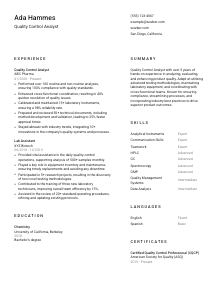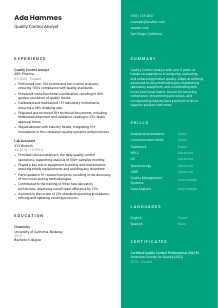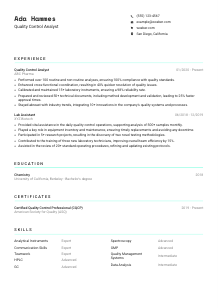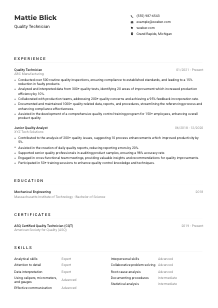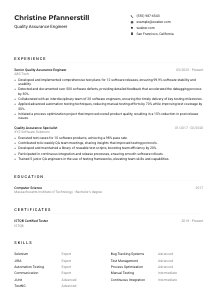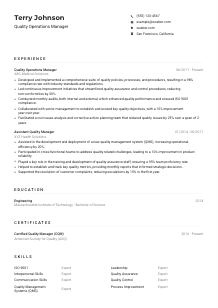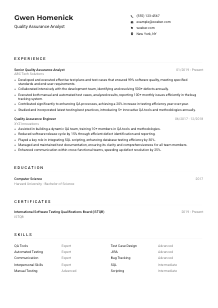Quality Control Analyst CV Example
Inspected products with eagle eyes, but your CV feels like a defect? Polish it to perfection with this Quality Control Analyst CV example, crafted using Wozber free CV builder. Learn how to articulate your precision and process knowledge to align with job criteria, making your career outlook as spotless as your evaluations!

How to write a Quality Control Analyst CV?
Hey there, aspiring Quality Control Analyst! You're about to embark on a mission to elevate your job search game. Leveraging Wozber's free CV builder, this guide is your ultimate playbook to craft an ATS-optimised CV that aligns perfectly with your dream job. Ready to turn your professional experiences into a compelling narrative? Let's unlock the secrets to creating a CV that not only passes the ATS test but also captivates hiring managers in the Quality Control field.
Personal Details
Let's kick things off with your Personal Details section - it's more than just a formality. Tailoring this section for a Quality Control Analyst role sets the tone for the rest of your CV. Here's how you can perfect it:
1. Make Your Name Memorable
Make sure your name is the spotlight on your CV. Use a clean, bold font to help your name stand out. This is your first impression, and you want it to say, 'I am the Quality Control Analyst you've been looking for!'
2. Reflect the Role
Directly below your name, state your career aspiration: 'Quality Control Analyst.' This positioning not only highlights your professional identity but immediately aligns your CV with the job you're targeting.
3. Ensure Your Contact Information is Flawless
Provide your current contact details, starting with your phone number and a professional email address. Remember, an error here could mean a missed opportunity, so double-check for accuracy.
4. Address the Job Location Requirement
Including 'San Diego, California' in your CV satisfies a specific job requirement straight away. It subtly reassures the employer that you're readily available and won't need relocation support.
5. A Link to Your Professional World
If you have a LinkedIn profile or a personal website showcasing your professional accomplishments or portfolio, definitely include it. Make sure it's polished and mirrors the information on your CV.
Takeaway
Consider your Personal Details section as the professional handshake setting the stage for your CV narrative. Each element should be meticulously chosen to introduce you as the ideal candidate for the Quality Control Analyst role. It's your CV's business card, so make every detail count.





Experience
The Experience section captures the essence of your professional journey. For a Quality Control Analyst position, here's how to make your experiences resonate with your potential employer:
- Performed over 100 routine and non‑routine analyses, ensuring 100% compliance with quality standards.
- Enhanced cross‑functional coordination, resulting in 40% quicker resolution of quality issues.
- Calibrated and maintained 15+ laboratory instruments, ensuring a 98% reliability rate.
- Prepared and reviewed 50+ technical documents, including method development and validation, leading to 25% faster approval times.
- Stayed abreast with industry trends, integrating 10+ innovations in the company's quality systems and processes.
- Provided vital assistance in the daily quality control operations, supporting analysis of 500+ samples monthly.
- Played a key role in equipment inventory and maintenance, ensuring timely replacements and avoiding any downtime.
- Participated in 5+ research projects, resulting in the discovery of two novel testing methodologies.
- Contributed to the training of three new laboratory technicians, improving overall team efficiency by 15%.
- Assisted in the review of 20+ standard operating procedures, refining and updating existing protocols.
1. Align with Job Requirements
Scour the job posting and highlight responsibilities and achievements from past roles that sync with phrases like 'perform routine and non-routine analysis' and 'coordinate with cross-functional teams.'
2. Present Your Career Timeline
List down your experiences starting with the most recent. Ensure each entry includes your title, company name, and employment dates. Let each role tell a part of your story leading up to your application for Quality Control Analyst.
3. Tailor Your Achievements
Highlight achievements such as 'Performed over 100 routine and non-routine analyses, ensuring 100% compliance with quality standards.' This not only shows you're capable but also directly matches the job's responsibilities.
4. Quantify Success Where Possible
Quantified achievements can significantly bolster your CV. Phrases like 'resulting in 40% quicker resolution of quality issues' give a tangible measure to your contributions.
5. Prioritize Relevance
Ensure your listed experiences are directly relevant to being a Quality Control Analyst. Tangential achievements might dilute the impact of your application.
Takeaway
Think of the Experience section as the backbone of your CV. It's where you prove your qualifications and showcase your ability to excel in the Quality Control Analyst role. Tailor your experiences to align with the job requirements, highlighting how your past achievements set you up for future success in this new role.
Education
Your CV's Education section is more than a list of degrees. For a Quality Control Analyst, it's about framing your academic journey to showcase a solid foundation in Chemistry or a related field:
1. Match the Job's Education Requirement
Start with the job's key demand: 'Bachelor's degree in Chemistry, Biochemistry, or a related scientific field.' Make sure your degree aligns perfectly with this requirement.
2. Keep It Structured
Adopt a clear format: Degree Name, Field of Study, Institution, and Graduation Date. This straightforward structure makes it easy for hiring managers to verify your qualifications.
3. Align Your Degree
If your degree directly matches the job criteria, like a 'Bachelor's degree in Chemistry,' place emphasis on it. This direct correlation highlights your suitability for the role.
4. Consider Listing Relevant Courses
While not always necessary, including pertinent courses can enrich your educational background, especially if your degree encompasses a wide range of subjects.
5. Showcase Additional Achievements
If you have any honors, relevant extracurricular activities, or projects that reflect your aptitude for the Quality Control Analyst role, don't hesitate to include them.
Takeaway
Your Education section should do more than tick a box; it should reflect your readiness and enthusiasm for the Quality Control Analyst role. Tailor it to the employer's needs, and let it be a testament to your foundational expertise and commitment to the field.
Certificates
Certificates can underline your commitment to continuous learning and specialization. Here's how to showcase them effectively for a Quality Control Analyst role:
1. Assess Required Certifications
Even if the job posting doesn't specify required certifications, including relevant ones like 'Certified Quality Control Professional (CQCP)' demonstrates a dedication to your profession.
2. Prioritize Pertinence
Choose certifications that resonate most with the Quality Control Analyst role. This focus ensures your CV is clutter-free and emphasizes your specialization.
3. Be Clear About Dates
Indicating when you obtained (or will renew) your certifications shows your commitment to staying updated in the rapidly evolving quality control field.
4. Embrace Continual Learning
The Quality Control field is always advancing. Demonstrating your ongoing education through recent certifications can significantly bolster your CV's appeal.
Takeaway
Your certificate section is a powerful tool to display your specialized knowledge and dedication to professional growth. Highlight certifications aligned with the Quality Control Analyst role to underscore your expertise and readiness to contribute meaningfully from day one.
Skills
In the realm of Quality Control Analysis, your skills are your tools. Let's refine your Skills section to reflect the competencies most valued in the position:
1. Identify Key Skills
Extract both explicit and implied skills from the job description. Skills like 'Analytical Instruments' and 'GMP knowledge' are directly mentioned and should be highlighted on your CV.
2. Match and Showcase Your Skills
Mirror skills from the job posting in your Skills section to ensure an immediate alignment between your capabilities and the job requirements.
3. Organize and Prioritize
Focus on listing the skills that are most relevant and in demand for a Quality Control Analyst. An ATS-friendly CV format helps ensure these key skills are easily visible.
Takeaway
Treat your Skills section as a showcase of the professional tools you bring to the Quality Control Analyst role. Curate it carefully to signal to hiring managers—and ATS systems—that you're an exemplary fit for the position.
Languages
In a diverse and global field like Quality Control, language skills can set you apart. Here's how to effectively present your linguistic proficiencies:
1. Meet Basic Requirements
Ensure you clearly list 'English: Fluent' to meet the fundamental requirement. This establishes your ability to effectively communicate in the primary language of the workplace.
2. Prioritize Key Languages
If you speak additional languages relevant to the company's market or industry, include them to illustrate your versatility and global perspective.
3. Detail Your Proficiency Levels
Using terms like 'Native,' 'Fluent,' 'Intermediate,' and 'Basic,' provide an accurate self-assessment of your language abilities, offering clarity on your level of proficiency.
4. Consider the Role's Global Scope
For roles that engage with international standards or teams, showcasing multilingual skills can greatly enhance your appeal as a candidate.
5. Reflect on the Job's Requirements
Adjust your language section based on the job's geographic and demographic reach. Demonstrating language skills can serve as a testament to your adaptability and cultural competence.
Takeaway
Presenting yourself as a multi-lingual Quality Control Analyst can open doors to opportunities within global or multicultural companies. View your language skills as not just a form of communication, but as a bridge to wider professional horizons and collaborative possibilities.
Summary
Your Summary is the highlight reel of your professional life. For the Quality Control Analyst role, let's ensure it's impactful and aligned with the job's needs:
1. Capture the Job's Essence
Digest the core of the Quality Control Analyst role. Understand the key responsibilities and qualities the job demands, then reflect those in your summary.
2. Begin with a Strong Introduction
Open with a clear statement about your professional identity, like 'Quality Control Analyst with over 5 years of hands-on experience.' This immediately positions you as an experienced and focused candidate.
3. Highlight Your Unique Contributions
Mention key skills and achievements that directly respond to the job's requirements. Discussing how you 'ensured 100% compliance with quality standards' directly links your capabilities to the demands of the position.
4. Keep It Concise and Powerful
Your summary should be a punchy, engaging introduction to you as a candidate. Aim for 3-5 lines that encapsulate your professional ethos and how you align with the Quality Control Analyst role.
Takeaway
Consider your Summary section as the prime real estate of your CV. It's your chance to grab the hiring manager's attention and make a compelling case for why you're the perfect fit for the Quality Control Analyst position. Let it set the tone for the remarkable skills and experiences that follow.
Embarking on Your Quality Control Analyst Career Path
You've taken an important step today by refining your CV with a sharp focus on the Quality Control Analyst role. Using Wozber's free CV builder, including its ATS-friendly CV templates and ATS optimisation tools, you've prepared a document that speaks directly to hiring managers' needs. Remember, your CV is more than a list of experiences—it's the narrative of your professional journey, tailored to land you your next opportunity. Keep striving for excellence in your field, and let your CV be the key that unlocks the door to your future success.

- Bachelor's degree in Chemistry, Biochemistry, or a related scientific field.
- Minimum of 3 years' experience in a Quality Control or related laboratory role.
- Proficiency in using analytical instruments and testing methodologies, such as HPLC, GC, and spectroscopy.
- Strong interpersonal and communication skills, both written and verbal.
- Familiarity with Good Manufacturing Practices (GMP) and Quality Management Systems (QMS) is preferred.
- Fluent English speaking and writing skills necessary.
- Must be located in or able to relocate to San Diego, California.
- Perform routine and non-routine analysis of raw materials, in-process, and finished products to ensure compliance with quality standards.
- Coordinate with cross-functional teams, including production, to troubleshoot and resolve quality issues.
- Maintain and calibrate laboratory equipment to ensure reliable and accurate results.
- Prepare and review technical documents, including method development and validation, standard operating procedures (SOPs), and reports.
- Stay updated on industry trends and regulatory requirements to enhance the company's quality systems and processes.





